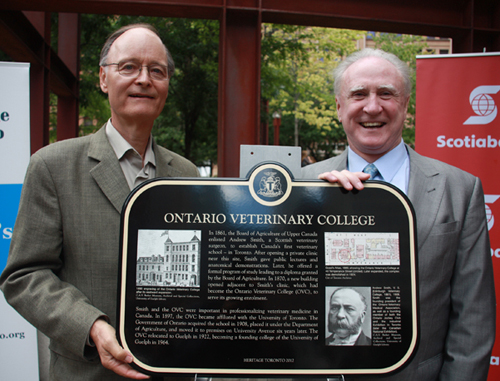
The Ontario Veterinary College (OVC) celebrated its Toronto roots on Sept. 9 with the unveiling of a heritage plaque to mark the original site of the college on Temperance Street.
About 70 people, including 35 descendants of OVC founder Andrew Smith, attended the event organized by former OVC dean Alan Meek and 1964 alumnus John Reeve-Newson, who has practiced veterinary medicine in the Toronto area for more than 40 years.
Heritage Toronto board member and Ryerson University professor Ross Fair thanked Meek and Reeve-Newson for the hours of volunteer effort involved in initiating and fundraising for the project. “Without them, we would not be here today celebrating this important part of Toronto’s history,” Fair said.
Smith established the Upper Canada Veterinary School in 1862. The name changed to Ontario Veterinary College in 1869 and, after years of expansion on Temperance Street, OVC moved to University Avenue in 1915. It was relocated to Guelph in 1922. OVC was affiliated with the University of Toronto from 1897 to 1964, when it became one of the founding colleges of the University of Guelph.
“For some time, I’ve thought it odd that there was nothing on Temperance Street to mark the spot where OVC was established,” Meek said. “The college’s 150th anniversary gave Dr. Reeve-Newson and I the incentive to remedy the situation with a lot of help from our friends.”
On the site of what is now an underground parking garage next to a tiny green oasis called Cloud Gardens, in the shadows of the 68-storey Scotia Plaza and 70-storey Trump International Hotel and Tower, Fair asked the crowd to imagine the sites and sounds and smells of the city 150 years ago.
Back then, Toronto’s economy relied on the health of horses that were “vital to people’s ability to work and travel in the old city,” he said.
Reeve-Newson thanked Heritage Toronto and sponsors of the project including Veterinary Purchasing Ltd., Lifelearn, Scotiabank, the Ontario Veterinary Medical Association as well as many individual donors. He also acknowledged the descendants of Smith who attended the unveiling, including great-great-granddaughter Angela Whelan, a 1990 OVC graduate, and her family. “You have an ancestor to be very proud of, and we’re proud to honour him,” Reeve-Newson said.
Other guests at the event included Stephen Samaroo of Scotiabank, University of Guelph vice-president (research) Kevin Hall, and Grant Crack, parliamentary secretary to the Ontario minister of agriculture, food and rural affairs. Crack presented a special certificate to OVC dean Elizabeth Stone in honour of the college’s 150th anniversary.
Meek added that the Ontario Genealogical Society helped track down additional Smith descendants, including great-great-grandson Jeff Smith, who is working with Prof. Peter Conlon, OVC’s associate dean (students), to complete the Smith family tree. The group has also combed through city and provincial archives in search of photographs and artifacts from the college’s first 60 years. The hunt is still on for a quality photograph of the original Temperance Street building, which was demolished in 1924.
Smith and the OVC played a vital role in professionalizing veterinary medicine in North America. By the time the Ontario government took over in 1908, the college had graduated more than 3,000 veterinarians.
Smith had a lifelong love of horses and was recognized as an expert on equine diseases. He was a founding member of the Ontario Jockey Club, now known as the Woodbine Entertainment Group, and he established the Industrial Exhibition in Toronto, renamed the Canadian National Exhibition in 1912. The OVC founder died in 1910.